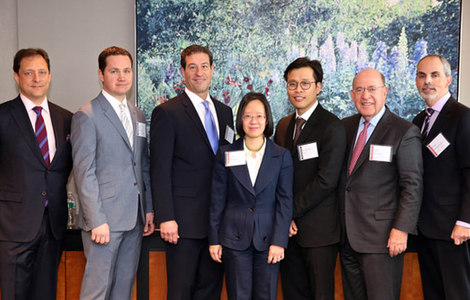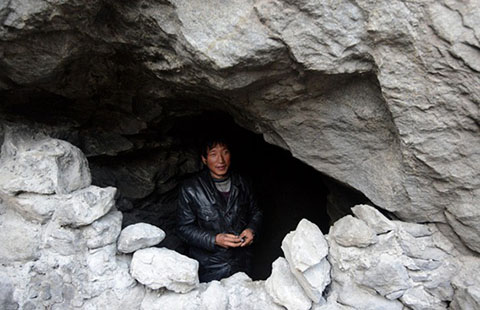China refutes US concern over security
Updated: 2015-03-04 11:14
By Gao Yuan in Beijing and Chen Weihua in New York(China Daily USA)
|
||||||||
Beijing hit back on Tuesday at criticism from United States President Barack Obama over a counterterrorism law being considered by Chinese lawmakers.
The Chinese Foreign Ministry said it makes perfect sense to protect information security using the country's own legislative system.
Ministry spokeswoman Hua Chunying said implementing the nation's first counterterrorism law is a "very necessary" requirement to combat terrorism and information leaks.
"We oppose any kind of cybersurveillance actions using information technology advantages.
"All countries are paying the highest attention to information security nowadays, and no one is in a position to criticize other countries' moves in protecting information safety," Hua said.
She was responding to comments by Obama that China should review the law to ensure smooth economic ties with the US.
China is likely to ask domestic and overseas information technology vendors to hand over critical information, such as encryption keys, passcodes and software source codes referencing the law.
US companies, including IBM, Oracle and Microsoft, have major concerns about submitting such data to the Chinese government.
They cite the significant business value of the information and say such a move may damage company credibility for some customers in the US.
The Obama administration fears China's tightening grip on information safety will harm the interests of US technology vendors that dominate the high-end IT market in China.
In a Reuters interview, Obama said, "(The law) is something that I've raised directly with President Xi (Jinping).
"We have made it very clear to them that this is something they are going to have to change if they are to do business with the United States."
The three companies were not available for comment on Tuesday. China Daily has learned that IBM and Microsoft had previously expressed willingness to work with the Chinese government on security issues.
According to industry consultancy IDC, China will contribute more than 10 percent of the global spending on IT by 2018 despite a slowing economy.
On Tuesday, Marie Harf, deputy spokesperson of the US State Department, said the US is very concerned that many aspects of China's recent regulatory actions which have been touted as means to bolster cyber security, actually, are neither effective cyber security measures nor consistent with the principles of free and open trade.
"We've urged the Chinese government to reconsider the restrictive banking regulations and to consult with US government and industry as they draft their counterterrorism law," she said.
"And we remain committed to expanding our cooperation with the Chinese government on cyber matters in areas where our interests align, and to candidly and constructively address issues and areas where they do not."
Kitty Fok, manager of IDC China, said increased data security awareness among top political leaders and State-owned enterprises following the Edward Snowden case in 2013 have greatly increased the use of local providers.
Snowden, a former US National Security Agency contractor, made headlines when he leaked top secret information about the agency's surveillance activities, including hacking into major US tech companies that are doing business in China and other parts of the world and forcing them to willingly and unwillingly collaborate in NSA's surveillance program.
NSA has also hacked into Chinese universities and telecom corporations, according to Snowden.
While some Silicon Valley tech giants have protested and urged the White House to reduce such activities, a report by Al-Jazeera America last year said that email exchanges between then NSA Director Keith Alexander and Google executives Sergey Brin and Eric Schmidt suggest a far cozier working relationship between some tech firms and the US government than was implied by Silicon Valley brass after the 2013 revelations about NSA spying.
China is not alone in its deep concern over cyber security. European nations, many of which are US allies, have also expressed concern over the data protection by companies such as Facebook and Google. German Chancellor Angela Merkel, whose cell phone was tapped by NSA, last year backed calls for European Internet services that are walled off from the US.
"The market share of foreign IT providers is set to drop because China is keen to have the ability to fully control and influence every IT product running in strategically important industries, such as banking and energy," Fok said.

 Floods displace over 2,000 in Brazil
Floods displace over 2,000 in Brazil
 New sports cars debut Geneva motor show
New sports cars debut Geneva motor show
 People celebrate upcoming Lantern Festival across China
People celebrate upcoming Lantern Festival across China
 Chinese investors take bite of Big Apple
Chinese investors take bite of Big Apple
 Intl Hair Freezing Contest winners announced
Intl Hair Freezing Contest winners announced
 Volcano Villarrica erupts in southern Chile
Volcano Villarrica erupts in southern Chile
 All dressed up
All dressed up
 Caveman saves money for family
Caveman saves money for family
Most Viewed
Editor's Picks

|

|

|

|

|

|
Today's Top News
China faces 'formidable challenges', says Li
GDP target drops to 7%
US ambassador to S.Korea attacked
China defends military items on ship
China refutes US concern over security
China could pass US in electric-car market: expert
China's defense budget to rise about 10%
Netanyahu assails Iran-nuclear talks
US Weekly

|

|








